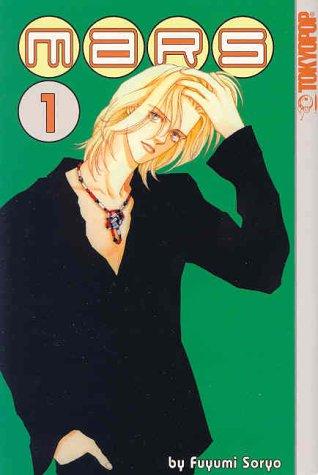Literally Graphic reviewed Mars volume 1 by Fuyumi Soryo (M.A.R.S., #1)
Review of 'Mars volume 1' on 'Goodreads'
4 stars
Looking at Fuyumi Soryo's wikipedia page, it was interesting to learn about some of her work that has yet to be translated into English, including her most recent work Cesare which centers around the infamous Borgia family of the Italian Renaissance and Cesare Borgia himself. As if we don't have enough pop culture about the Borgia! The breadth of her work is actually quite large, considering her first two series were both shojo manga centered around romancing delinquent male youth, her third title Eternal Sabbath is a futuristic seinen title that is all about genetically engineering humans to be immortal. I did actually pick up a volume or two of Eternal Sabbath as well when I was really into genetic engineering back in High School, but I had no money and a horrible library selection so didn't get very far.
But circling back to the volume at hand, the goodreads' summation of Mars Vol. 1 is as follows:
"A bad boy can change a good girl forever. Rei is the school delinquent. Kira is shy and studious. What they see in each other is a mystery to their friends. What they find in each other is a miracle to themselves. With a style that is artistic and chic, this tale of restless and confused high school love will appeal to young women everywhere.
Kira and Rei might as well be from different planets. She's a shy art student, afraid of boys and hated by her classmates. He's a rebellious motorcycle racer with girls dropping left and right just to talk to him. Their lives become intertwined when Kira asks Rei to model for her and, to everyone's surprise, he agrees. As these two battle their personal demons and the pressures of their classmates, they learn not only to love each other, but themselves."
Which leaves me a bit conflicted since, as I said, I did end up liking this volume, but besides the part where they come to love themselves - it's kind of bad! I mean, the terms "bad boy" and "good girl" alone really make me want to run for the hills, and doesn't really describe Rei and Kira anyway. OK, maybe a little bit, but does Rei really count like a "bad boy" if he's actually a really nice guy? Despite being a reckless young man who doesn't always act in the most respectful way, in this first volume in particular he is set up against a clean cut teacher who is actually a predator praying on our vulnerable main female character. Of course, the main male character being nice to main female character is kind of necessary for things to progress, and Rei really shouldn't get points. It's not an uncommon balancing act, but I do think it leans a bit too far to the Rei is a nice guy side (complicated guy but nice) to just label him with the hot button keyword "bad boy".
Another romance cliche that I don't like, and this volume certainly played with, is the boy saves girl from herself trope. I wanted to name that right up front because I do think that's what it will be for some people, and maybe even me too if I continued to reread the series. As it is I can brush it away by some vague idea that they save each-other from different things throught the series, perhaps in a gender essential sort of way... Not perfect but not something that my nostalgia goggles can't overcome - I was much more invested in binary genders at the time of my initial read sowhat can I say. I wouldn't turn down a gender swapped or gender queered version.
What does help me appreciate this reread more now is that I'm trying to create more space in my life to appreciate romance and wish fulfillment sorts of romance stories in particular at this time. As I believe I have outlined in a previous review, it is my perspective that media geared towards what the market thinks of as "female" is lesser in so many ways. Since I now see love as such a necessary but also dangerous thing, I think having stories that fulfill this longing I (and many other people) feel at various times in our life is a beautiful thing. Especially as more and more affirming romances that tell people on the outside of the mainstream that they are OK is produced. Not that I enjoy everything that falls within these parameters but I certainly question when I don't and really try to figure out what is bothering me in particular, assuming that we have to like everything at any given time for it to be good.
I also don't like the woman on woman drama, especially because it centers around who has access to a man. Thankfully the characters are a bit more complicated then Atlas Shrugged so I can deal. But it is a cliche that should be pointed out whenever possible so it can die as quickly as possible.
That said, switching from the defensive to the offensive (I guess) there were things I just liked about this first volume and not just in response to things I noticed might be "problematic":
A) I enjoy love stories, not really will they won't they dramas unless they are cute and funny, but stories about people coming together and caring for each-other.
B) I like male identified characters who are comfortable enough in themselves that they can play with gender expectations. This particularly struck me in the scene where Kira is sketching Rei for the first time with the MARS bust. I've possibly never been so turned on by a man on manish thing kiss.
C) Shy girls in high school gets the hot guy. What can I say, I was a walking (but not talking) cliche in high school and even more of a doormat then Kira.
D) Did I mention I like guys with long hair?
E) A bit redundant but lonely people finding each-other!
If this reminds you of anything you've read recently, especially if it's Manga, let me know please!
That said, if you didn't catch it earlier - flipping back through the book to be sure I covered everything - there is an overstepping of physical boundaries in this first volume and threat of rape and some flashbacks to this event later on in the story. There's also a point where one woman threatens another with physical violence and gets very close to following through. So if this sounds like something that you don't want to see for sure do not check out this somewhat dated and cliche book that I still find room in my heart for.
As I've outlined before this is a pretty hetero-normative romance book, even if there is a touch of bishounen which is maybe playing with gender in a way? Race in this comic is fairly standard for manga I guess - if you have articles or books or thoughts on race in Manga feel free to share. While it's hard to say off of just this one volume, I think that class does come into play a bit, or at least there is some concern about money so yay?

